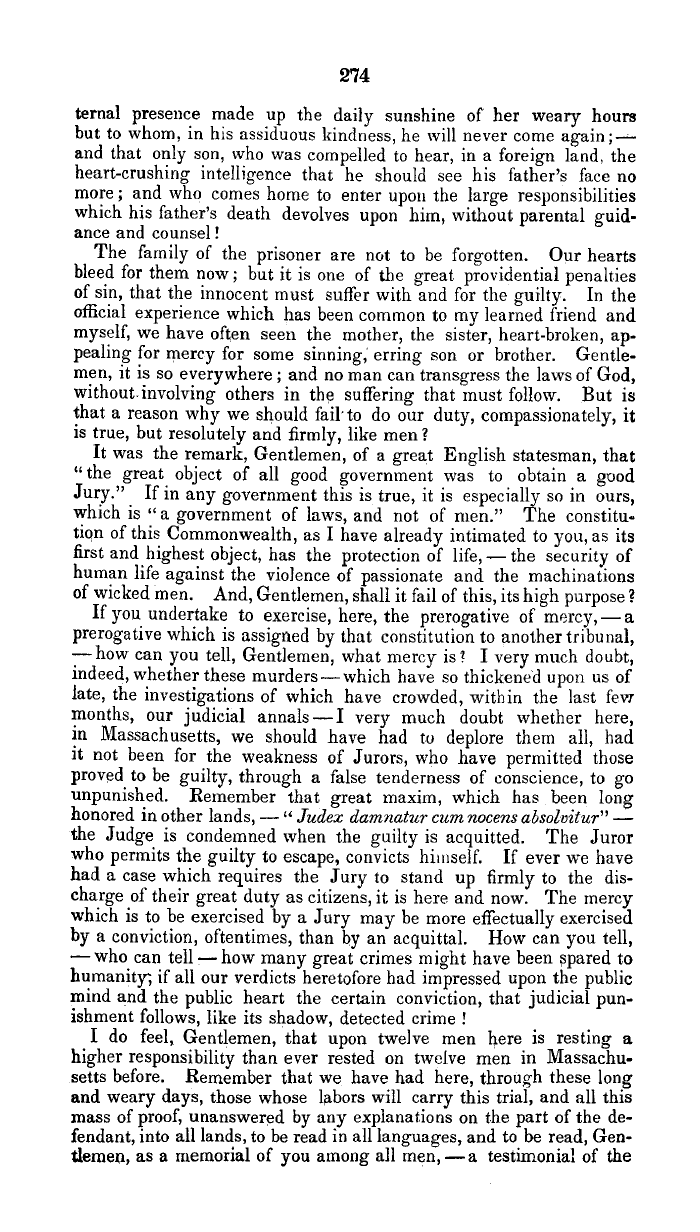|
274
ternal presence made up the daily sunshine of her weary hours
but to whom, in his assiduous kindness, he will never come again;-
and that only son, who was compelled to hear, in a foreign land, the
heart-crushing intelligence that he should see his father's face no
more; and who comes home to enter upon the large responsibilities
which his father's death devolves upon him, without parental guid-
ance and counsel!
The family of the prisoner are not to be forgotten. Our hearts
bleed for them now; but it is one of the great providential penalties
of sin, that the innocent must suffer with and for the guilty. In the
official experience which has been common to my learned friend and
myself, we have often seen the mother, the sister, heart-broken, ap-
pealing for mercy for some sinning; erring son or brother. Gentle-
men, it is so everywhere; and no man can transgress the laws of God,
without. involving others in the suffering that must follow. But is
that a reason why we should fail to do our duty, compassionately, it
is true, but resolutely and firmly, like men ?
It was the remark, Gentlemen, of a great English statesman, that
'° the great object of all good government was to obtain a good
Jury." If in any government this is true, it is especially so in ours,
which is °1 a government of laws, and not of men." The constitu-
tion of this Commonwealth, as I have already intimated to you, as its
first and highest object, has the protection of life,-the security of
human life against the violence of passionate and the machinations
of wicked men. And, Gentlemen, shall it fail of this, its high purpose?
If you undertake to exercise, here, the prerogative of mercy,- a
prerogative which is assigned by that constitution to another tribunal,
-how can you tell, Gentlemen, what mercy is? I very much doubt,
indeed, whether these murders-which have so thickened upon us of
late, the investigations of which have crowded, within the last few
months, our judicial annals-I very much doubt whether here,
in Massachusetts, we should have had to deplore them all, had
it not been for the weakness of Jurors, who have permitted those
proved to be guilty, through a false tenderness of conscience, to go
unpunished. Remember that great maxim, which has been long
honored in other lands, - °' Judex damnatur cum nocens absolvitur" -
the Judge is condemned when the guilty is acquitted. The Juror
who permits the guilty to escape, convicts himself. If ever we have
had a case which requires the Jury to stand up firmly to the dis-
charge of their great duty as citizens, it is here and now. The mercy
which is to be exercised by a Jury may be more effectually exercised
by a conviction, oftentimes, than by an acquittal. How can you tell,
-who can tell-how many great crimes might have been spared to
humanity; if all our verdicts heretofore had impressed upon the public
mind and the public heart the certain conviction, that judicial pun-
ishment follows, like its shadow, detected crime !
I do feel, Gentlemen, that upon twelve men here is resting a
higher responsibility than ever rested on twelve men in Massachu-
setts before. Remember that we have had here, through these long
and weary days, those whose labors will carry this trial, and all this
mass of proof, unanswered by any explanations on the part of the de-
fendant, into all lands, to be read in all languages, and to be read, Gen-
tiemeu, as a memorial of you among all men, -a testimonial of the
|

